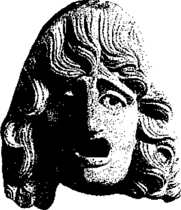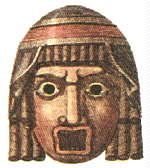Important Terms in Greek Tragedy

Catharsis: cf. Page 800, note two in the Norton anthology. Catharsis has two definitions, one medical, one religious. Keep in mind that whether we understand catharsis as religious purification or as medical purging, that the Greek tragedian expects the audience (i.e. ourselves) to respond with a sense of pity and a sense of divine justice.
Question: Do the events of The Eumenides result in a catharsis for the audience? Consider how we move from concern for Orestes' plight to terror at the Furies' threats to his vindication before the jury at Athens.
Hamartia: The tragic hero undergoes great pain and suffering because she or he makes a mistake in judgment or has a tragic flaw. Hamartia is also one of the Greek words the Apostle Paul uses for describing the sin of humanity. Not all Greek heroes fall because of their sin; some fall because they are trapped in unavoidable circumstances.
Question: What is the tragic flaw of Orestes? Is he guilty of sin?
Hubris: Pride, especially in attempting to go outside or beyond human knowledge, action, or capacity. Often, hubris is a direct violation of the will of the gods.
Question: Does anyone exhibit hubris in The Eumenides?
Spoken and Sung Elements in Greek Tragedy

[The material on spoken and sung elements is optional material and not testable for our class purposes.]
Ancient Greek tragedy contains both prose and poetry. Poetry was both spoken and sung.
Typical sung elements:
- Parodos: the opening ode sung by the chorus as they enter the orchestra.
- Stasima: ensemble songs
The Song of the Furies' Dance on pages 592-593 constitute a typical stasima.
- Hemechoria: songs divided between two portions of the ensemble.
- Monodia: songs sung by one actor
- Diodia: songs sung by two actors in tandem or as a duet.
Typical spoken elements:
- Prologos: the opening before the entrance of the chorus.
Pythia's opening prayer and Apollo's answer constitute the prologos.
- Epeissodes: the developing scenes
- Exodus: the final concluding scene.
Athena's final investment of the Furies with their new role constitute the exodus.
E. Beatrice Batson's Definition of Tragedy

Batson defines tragedy as the following: "Tragedy is a narrative form of literature in which a tragic protagonist, who possesses greatness of spirit, commits himself to an undertaking of great magnitude within a given situation and, as a result, comes to spiritual suffering usually followed by perception and death and possibly by 'redemption.' "(214)
Batson's definition has the following elements:
- a narrative form of literature
- protagonist who possess greatness of spirit [Batson does not mean that the protagonist is necessarily admirable for all he or she does, but rather that the hero is elevated in human potential.]
- protagonist commits himself or herself to an undertaking of great magnitude
- protagonist comes to spiritual suffering {Keep in mind that "spiritual" need not be "holy" here.]
- the suffering is usually followed by perception and death
- possibly, the suffering results in redemption

Batson's Definition Applied to Orestes
-
Is Orestes the hero of The Eumenides?
-
Is Athena or Apollo?
-
Is Athens itself a kind of hero?
| Tragic protagonist w/ greatness of spirit | Orestes is obedient to the will of the gods Perhaps we can understand him as courageous. | Apollo comes to the defense of Orestes Athena is dignified and wise in her judicial judgment. | Athens as a city is great in its democratic nature, though flawed by the past. |
| Undertaking of great magnitude | Orestes, after avenging his father, flees to the seat of justice | Apollo opposes the Furies Athena works to guarantee justice and appease the Furies | Athens seeks to bring justice to its citizens and prosperity by appeasing the old and new gods. |
| Spiritual suffering | Orestes undergoes great loss in his obedience to the gods | Apollo? Athena? | Athens suffers in its search to balance the old code of familial vengeance with its new need for principled law |
|
perception and death (redemption) |
Orestes learns that the gods will vindicate the just, obedient person | Apollo? Athena perceives that the old law of fury can be subsumed with the new law of respect for the earth. The Furies are "redeemed" for the prosperity of Athens | Athens learns that trial by jury can result in a practical (if admittedly contestable) process of appeal for crimes. |
